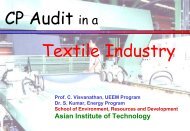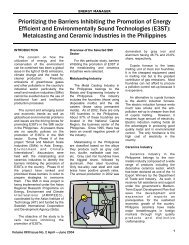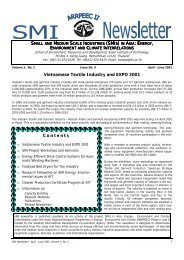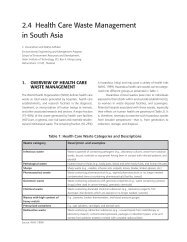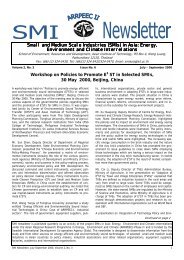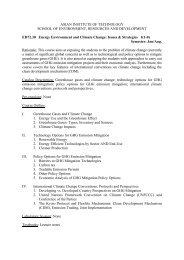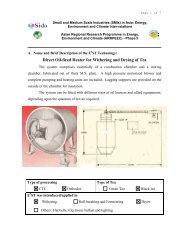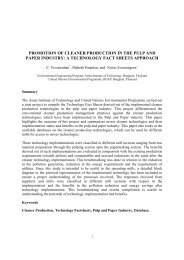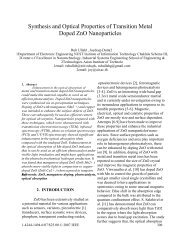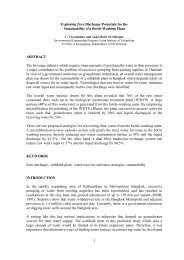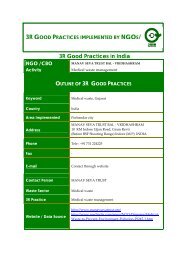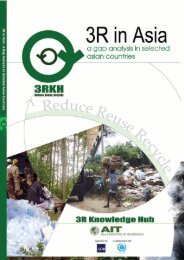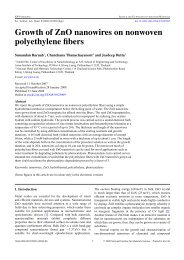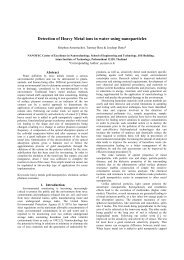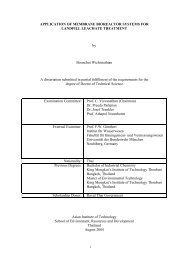Evaluation of Plastic Waste Management in Thailand Using Material ...
Evaluation of Plastic Waste Management in Thailand Using Material ...
Evaluation of Plastic Waste Management in Thailand Using Material ...
Create successful ePaper yourself
Turn your PDF publications into a flip-book with our unique Google optimized e-Paper software.
<strong>in</strong>stitution. This group <strong>in</strong>cludes the private sectors and government organizations such as<br />
PIT, PTIT, TPIA, DIW, TIPMSE, and PIU.<br />
<strong>Plastic</strong> wastes generated from waste generators are collected by waste collectors. For<br />
example, municipalities collect daily plastic wastes to dispose properly. <strong>Waste</strong> generators<br />
sometimes sell their recyclable wastes to waste shops. The environmental issues are caused<br />
from process<strong>in</strong>g <strong>of</strong> plastic <strong>in</strong>dustries and recycl<strong>in</strong>g factories should be monitored and<br />
controlled through the environmental laws <strong>of</strong> the environmental organizations. F<strong>in</strong>ally, the<br />
public-private sector <strong>in</strong>stitutions concern on the plastic production and recycled products.<br />
They focus on the demand <strong>of</strong> plastic products and acceptation <strong>of</strong> recycled product quality<br />
<strong>of</strong> waste generators.<br />
2. Scenario 2: Increase <strong>in</strong> recycl<strong>in</strong>g rate by 30%<br />
Most stakeholders <strong>of</strong> this scenario relate to the 3Rs pr<strong>in</strong>ciple and plastic bag taxation such<br />
as consumers, producers, importers, local adm<strong>in</strong>istration, bio-plastic companies, plastic<br />
bags and foam fund, environmental organizations, waste shops, recyclers, disposers and<br />
public-private sector <strong>in</strong>stitutions. First, producers and importers support the alternative<br />
plastic products like low-plastic conta<strong>in</strong><strong>in</strong>g bottles and recyclable plastic bags. <strong>Plastic</strong> bag<br />
factories and importers have to pay plastic bag and foam tax when they produce and import<br />
plastic bags. Consumers have three choices to consume plastic products followed by the<br />
3Rs law and plastic bag tax such as pay for plastic bag charge, reuse plastic products, and<br />
use bio-plastics and recycled products. Figure 4.33 shows the relationship between<br />
stakeholders <strong>of</strong> the scenario 2.<br />
<strong>Plastic</strong> bag & Foam<br />
Fund<br />
Producers &<br />
Importers<br />
M<strong>in</strong>imarts &<br />
Department<br />
stores<br />
Consumers<br />
Figure 4.33 Relationship <strong>of</strong> stakeholders <strong>of</strong> scenario 2<br />
81<br />
Local adm<strong>in</strong><br />
Private sectors &<br />
Bio-plastics<br />
companies<br />
Recyclers & Disposers<br />
<strong>Waste</strong> shops<br />
Reuse plastics<br />
Pay for plastic<br />
bag charge<br />
Use bio-plastic<br />
Public-Private<br />
sector <strong>in</strong>stitution<br />
(TPFRIA, TIPMSE,<br />
TBIA, PIT, TPIA)<br />
Environmental<br />
organization<br />
(PCD, MNRE)



